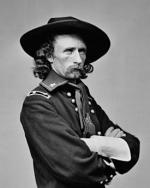Disable ads!
George Armstrong Custer
George Armstrong Custer (December 5, 1839 – June 25, 1876) was a United States Army officer and cavalry commander in the American Civil War and the American Indian Wars. Raised in Michigan and Ohio, Custer was admitted to West Point in 1858, where he graduated last in his class. With the outbreak of the Civil War, Custer was called to serve with the Union Army. Custer developed a strong reputation during the Civil War. He fought in the first major engagement, the First Battle of Bull Run. His association with several important officers helped his career, as did his success as a highly effective cavalry commander. Custer was eventually promoted to the temporary rank (brevet) of major general and promoted major general of Volunteers. (At war's end, he reverted to his permanent rank of captain.) At the conclusion of the Appomattox Campaign, in which he and his troops played a decisive role, Custer was present at General Robert E. Lee's surrender. After the Civil War, Custer was dispatched to the west to fight in the American Indian Wars and appointed lieutenant colonel of the U.S. 7th Cavalry Regiment where he and all his men were killed at the Battle of the Little Bighorn in 1876 fighting against a coalition of Native American tribes. The battle is popularly known in American history as "Custer's Last Stand." Custer and his men were defeated so decisively in this battle that the Battle of the Little Bighorn has overshadowed all his prior achievements.
 Read more on wikipedia.org Read more on wikipedia.org
 All quotes by George Armstrong Custer All quotes by George Armstrong Custer
 Edit Edit
|

|
|
|
|
|
Background photo by Giuliana
|